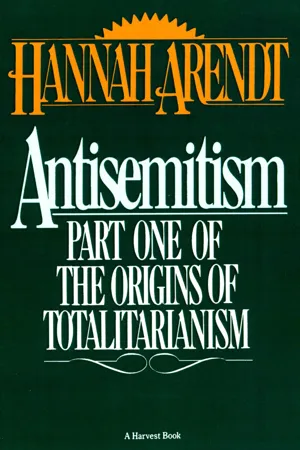
- 156 pages
- English
- ePUB (mobile friendly)
- Available on iOS & Android
About this book
In the first volume of her landmark philosophical work, The Origins of Totalitarianism, the political theorist traces the rise of antisemitism in Europe.
Since it was first published in 1951, The Origins of Totalitarianism has been recognized as the definitive philosophical account of the totalitarian mindset. A probing analysis of Nazism, Stalinism, and the "banality of evil", it remains one of the most referenced works in studies and discussions of totalitarian movements around the world.
In this first volume, Antisemitism, Dr. Hannah Arendt traces the rise of antisemitism to Central and Western European Jewish history during the 19th century. With the appearance of the first political activity by antisemitic parties in the 1870s and 1880s, Arendt states, the machinery that led to the horrors of the Holocaust was set in motion. The Dreyfus Affair, in Arendt's view, was "a kind of dress rehearsal"—the first modern use of antisemitism as an instrument of public policy and of hysteria as a political weapon.
"The most original and profound—therefore the most valuable—political theorist of our times."—Dwight MacDonald, The New Leader
Frequently asked questions
- Essential is ideal for learners and professionals who enjoy exploring a wide range of subjects. Access the Essential Library with 800,000+ trusted titles and best-sellers across business, personal growth, and the humanities. Includes unlimited reading time and Standard Read Aloud voice.
- Complete: Perfect for advanced learners and researchers needing full, unrestricted access. Unlock 1.4M+ books across hundreds of subjects, including academic and specialized titles. The Complete Plan also includes advanced features like Premium Read Aloud and Research Assistant.
Please note we cannot support devices running on iOS 13 and Android 7 or earlier. Learn more about using the app.
Information
Index
A
Ahlwardt, Hermann, 108
Table of contents
- Title Page
- Contents
- Copyright
- Dedication
- Preface
- Epigraph
- Antisemitism as an Outrage to Common Sense
- The Jews, the Nation-State, and the Birth of Antisemitism
- The Jews and Society
- The Dreyfus Affair
- Bibliography
- Index
- Read More from Hannah Arendt
- About the Author
- Connect with HMH
- Footnotes